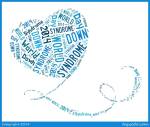This is a lesson plan I prepared for my Speech and Language Therapy students at AMC College to celebrate World Down Syndrome Day. Perhaps it can used with other students, too. The inspiration came from the Saatchi & Saatchi video circulated all over the internet a few days ago.
World Down Syndrome Day (WDSD) 2014
Lesson Plan
Language level: Intermediate – Upper Intermediate
Learner type: Adults
Time: 60 minutes
Activity: Speaking, reading short texts, writing and watching a short video
Topic: Down Syndrome
Language: Down Syndrome related vocabulary, Can/Can’t, (not) be able to, should/shouldn’t
Skills : talking about myths and facts related to Down Syndrome
Materials: Wordle, Short video, sets with cards
Warmer
Show the Ss your Cloud and ask them to make out what the topic of this lesson is about : World Down Syndrome Day (WDSD) 2014. Explain that today, 21st March, is World Down Syndrome Day.
Ask them what they know about the topic
Do they know any people with Down Syndrome?
Would they like to know more?
Step 1
Ask your students if they know what people with Down Syndrome can or can not do. Write their ideas on the board.
Tell them that they are going to watch a short video called ‘DEAR FUTURE MOM | March 21 ‘
Explain to them that the email a pregnant mother, expecting a child with Down syndrome, sent to CoorDown (Italian Association of People with Down Syndrome) posed the following question : “What kind of life will my child have?”
It triggered a video, created by Saatchi & Saatchi , where 15 individuals with Down Syndrome, from across Europe , sent her a heartwarming message in their native languages . Show the video.
Step 3
Ask them to compare their ideas about these people’s abilities with the video’s ideas. Were their ideas mentioned in the video? What other ideas were mentioned?
Write them on the board.
Step 4
Ask the Ss if they have ever thought about the way we address people with Down Syndrome. Put them in groups.
What language should we use when referring to Down Syndrome?
What language shouldn’t we use because it can be hurtful?
Let them look at the expressions below and list them accordingly.
intellectually and developmentally disabled, a Down syndrome child, Down’s child, a child with Down syndrome, he has Down’s, suffer from, afflicted by, syndrome, disease, condition, cognitive disability, retarded, retardation, differently-abled, handicapped, ‘challenged’, idiot, moron, imbecile
Positive Language we should use when referring to Down Syndrome
Derogatory language we should NOT use when referring to Down Syndrome
Go round the class and offer any help/ explanations needed with the vocabulary.
Tell them that, in fact, as renowned educator and inclusion specialist Patti McVay emphasizes, “the best name to call someone is the name he or she was born with.”
(The information was taken from the Global Down Syndrome Foundation site http://www.globaldownsyndrome.org/about-down-syndrome/words-can-hurt/ )
Step 5
Write on the board ‘Myths and Facts”.
Pair up Ss with a partner from a different group. Ask them if they think that there are a lot of misconceptions in society about people with Down Syndrome. Why?
Organize the Ss in groups and give them the cards about the «Myths and Facts».
MYTHS & FACT ABOUT DOWN SYNDROME
The cards are divided into 2 categories: one set with Myths and another with Facts. Give the cards to the groups and explain that they have to read the cards about the Myths and the ones about the facts regarding Down Syndrome and match them. Every time they find a match, allow some feedback if needed.
(The information regarding the myths and facts about Down Syndrome was taken from the site : http://www.ndss.org/Down-Syndrome/Myths-Truths/)
Step 6
Have a short discussion about the information they have just read.
Which fact/myth really surprised them?
Were they familiar with these facts?
Did the Ss have the same opinion? Why? Why not?
Has society really changed in the way they see people with Down Syndrome?Why? Why not?
Follow up
Ask them to research and then write a short article about people with Down syndrome who broke the stereotypes and they are now having a professional career in any sector which they would be barred from in the past, like teaching, for example.

Lovely lovely lesson Vicky so happy you posted this
Thank you, Marisa for your kind words.
How did your class go? Found your blog via my friend Theodora Pap….
They liked it and participated. There was actually a girl whose sister has Down Syndrome so we had an interesting discussion about her experience .
Thats great. My two year old son has ds too. He rocks our orld. love him to bits.. We Deffinately hate the R words. Hope your subject created some modern day awareness and acceptance for ppl with DS. 🙂
Good post. Thank you, Ms. Vicky.
Thank you Robert! Thank you for the help, too!
Great lesson plan Vicky, my Spanish adults quite enjoyed it , and it happened to have a mum in a class whose daughter has Sydrome and she was almost crying with the video. Please share your wonderful ideas in our community we are trying to set up on facebook https://www.facebook.com/TeachingEnglish21C